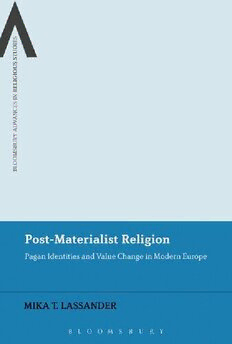
Post-Materialist Religion: Pagan Identities and Value Change in Modern Europe PDF
226 Pages·2014·4.112 MB·English
Most books are stored in the elastic cloud where traffic is expensive. For this reason, we have a limit on daily download.
Preview Post-Materialist Religion: Pagan Identities and Value Change in Modern Europe
Description:
Post-Materialist Religion discusses the transformations of the individual’s worldview in contemporary modern societies, and the role general societal value change plays in these. In doing so, Mika Lassander brings into conversation sociological theories of secularisation and social-psychological theories of interpersonal relations, the development of morality, and the nature of basic human values. The long-term decline of traditional religiosity in Europe and the emerging ethos that can be described as post-secular have brought religion and values back into popular discussion. One important theme in these discussions is about the links between religion and values, with the most common assumption being that religions are the source of individuals’ values. This book argues for the opposite view, suggesting that religions, or people’s worldviews in general, reflect the individual’s priorities.Mika Lassander argues that the transformation of the individual’s worldview is a direct consequence of the social and economical changes in European societies since the Second World War. He suggests that the decline of traditional religiosity is not an indication of linear secularisation or of forgetting traditions, but an indication of the loss of relevance of some aspects of the traditional institutional religions. Furthermore, he argues that this is not an indication of the loss of ethical value base, but, rather, a change in the value base and consequently the transformation of the legitimating framework of this value base.
See more
The list of books you might like
Most books are stored in the elastic cloud where traffic is expensive. For this reason, we have a limit on daily download.
